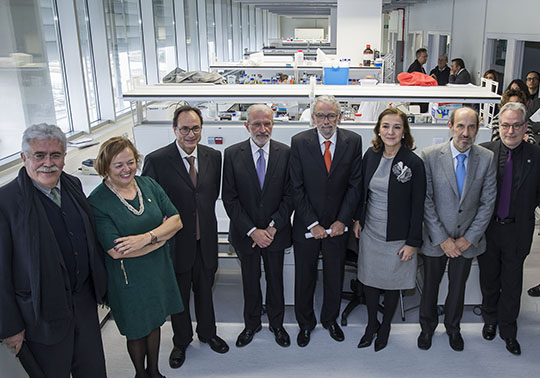Users
Social media
- More details here...
- Address
Parc Científic de la Universitat de València C/
Catedrático Agustín Escardino, 9
46980 Paterna (Valencia) Spain - Email:
iu.i2sysbio@uv.es - Phone:
(+34) 963544810
- Address
Links
The value of scientific innovation focuses on the inauguration speeches of the Institute of Integrative Systems Biology

Investigation
The value of scientific innovation focuses on the inauguration speeches of the Institute of Integrative Systems Biology

The rector of the University of Valencia, Esteban Morcillo, and the president of the CSIC Rosa Menéndez have This Tuesday the Institute of Integrative Systems Biology (I2SYSBIO) was inaugurated, a new research center dedicated to the study of complex biological systems, especially microorganisms, with applications mainly in biomedicine and biotechnology. They have been accompanied by the Secretary of State Carmen Vela, the Minister of History, Vicent Soler, and the director of I2SYSBIO, José Luis García López.
“Integrative Systems Biology is an emerging and fundamental discipline for modern biology. Studying Nature from a holistic perspective, different from the narrow vision with which we worked a while ago, facilitates the transfer of knowledge. That is why we are in the Scientific Park of the University of Valencia, surrounded by companies and industry. We can contribute a lot to the productive sector, but to be truly competitive we need a push to consolidate these infrastructures and the human resources we have," said the director of the center, José Luis García, at the inauguration of the Institute of Integrative Systems Biology, which took place this morning at the University's Science Park.
In this sense, Councilor Vicent Soler has referred to the Knowledge as the factor with the greatest capacity to advance the economy from sustainability in all its aspects. “Science must be supported and promoted with more resources, and for this we need an autonomous financing system capable of providing solutions not only to what is urgent but also to what is necessary.”
The current study of the biological processes of living organisms, treated as complex systems, requires the collaboration of various theoretical and experimental disciplines that come together in Integrative Systems Biology. The advances in systemic knowledge of life come together in search of solutions in the field of health or in the pharmaceutical and agri-food industries. This is a recent area of scientific research, also called New Biology, which draws on the knowledge of geneticists, biochemists, cell biologists, engineers, physicists or bioinformaticians, among others.
The rector Esteban Morcillo has highlighted the importance of collaboration between institutions. “The inauguration of the I2SYSBIO is, once again, the result of the effort on the part of the Universitat de València and the CSIC, which have been collaborating for years to get the best out of the knowledge generated by its researchers, the effectiveness of its technicians, its managers, because a work cannot prosper if it is not choral, collective,” he said. "The institute that we inaugurate today is not an empty building, nor a shell so that we can open a plaque. Here there are people researching, producing. The Nature Index already reports on the existence of the I2SYSBIO and there are activities with the signature of this center, thanks to the people who work here and who are the ones who lead the institutions to international recognition."
For her part, Rosa Menéndez has shown her satisfaction at witnessing the birth of this mixed research center. the few months after taking office as president of the CSIC. "The Universitat de València is a highly appreciated partner of the CSIC. This founding agreement so that technology-based companies can install their research laboratories here marks a beginning that will, without a doubt, be transcendent," he noted.
The I2SYSBIO, a joint research center of the Universitat de València and the CSIC, focuses its research on the structure, function, dynamics, evolution and manipulation of complex biological systems, with an emphasis on the study of microorganism systems. Structured in five areas of action – interdisciplinary work to resolve common problems, development of excellent research, transfer of knowledge, training of researchers and promotion of Integrative Systems Biology in Spain – the institute was born open to the participation of companies. This is the case of the biotechnology company BIOPOLIS, the first private entity to sign a collaboration protocol with the new Institute of Integrative Systems Biology.
“The talent and capacity of the scientists of this center with an innovative vocation mean that the transfer is not a unidirectional action, but rather a collaboration between science and business that will serve to provide solutions to real problems in the face of a better, more egalitarian, more democratic society,” said Secretary of State Carmen, closing the event. Vela.
Co-directed by the microbiologist José Luis García López (CSIC) and the biochemist Juli Peretó (UV), the institute covers five biological research programs –Theoretical and Computational, Systems of Molecular Interactions and Regulation, Pathogen Systems, Evolution of Symbionts, and Applied Systems Biology and Synthetic Biology–, and has thirteen research groups.
Hosted in a building recently built in the Science Park of the University of Valencia, the I2SYSBIO begins its journey with a staff of about 80 workers - including researchers and support staff -, and a scientific background of excellence contributed by researchers mostly from the Cavanilles Institute of Biodiversity and Evolutionary Biology, of the University of Valencia, and the Institute of Molecular and Cellular Biology of Plants, a mixed center CSIC-UPV.
The new building is structured in large open and shared spaces, as co-working laboratories, inspired by the work philosophy of the most advanced research centers, and designed to promote collaboration between researchers from different theoretical, experimental and computational areas in common projects.
List of links:


